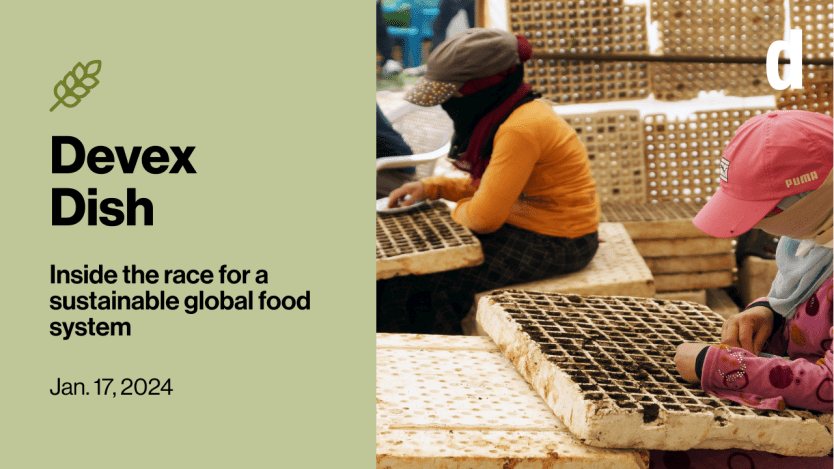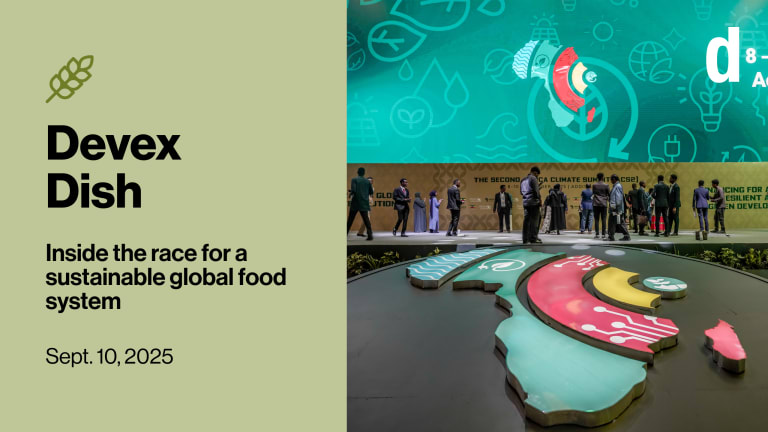
A healthy diet — and a sustainable food system — starts with the right seeds. And in a time of climate change, seeds must be resilient to extreme weather events if they are to survive.
Nearly 14 years of conflict in Syria — combined with the effects of climate change — have ravaged the land, taking a particular toll on the country’s seeds. A pilot project to boost farmers’ access to high-quality, climate-resilient seeds could offer some hope, writes Devex contributor Helen Morgan, and the positive effects may be felt far beyond those farms.
The International Rescue Committee’s Seed Security Solution Package kicked off in northeast Syria in October 2022. Some 30 farmers were incentivized through contests and peer-to-peer learning to multiply “pure genetic seed” adapted to the current climate that could produce seed again for several seasons. They were given two varieties of seed, along with support and training from agricultural staff, and measured indicators at all stages of growth to see which were more productive and drought-resilient.
Adherence to climate-smart practices — such as the utilization of crop residues, more efficient irrigation systems, or using organic fertilizer — has been “shockingly high for the first year,” according to IRC’s climate resilience lead Tara Clerkin.
This is a preview of Devex Dish
Sign up to this newsletter to get the inside track on how agriculture, nutrition, sustainability, and more are intersecting to remake the global food system in this weekly newsletter.
Yields were also higher, though IRC noted it’s hard to attribute the increase solely to the project as so many factors contribute to yield. Still, participating farmers were happy to learn and eagerly shared photos and exchanged information on their WhatsApp group. The project also emphasized women’s participation.
Similar IRC pilot projects or early-stage research are ongoing in other crisis-affected contexts, including Pakistan, South Sudan, and Niger. Seed selection is one of the most important climate adaptation decisions a farmer can make, IRC says, so this kind of knowledge can build resilience in agropastoral communities.
Read: Climate-resilient seeds offer farmers in Syria a path to food security
ICYMI: How hyperlocal seed banks are building climate-resilient agriculture
A mouthful
“When you think about soil, the U.S. secretary of state is probably not the first person who comes to mind. But the truth is soil is literally at the root of many pressing national security challenges that we face.”
— Antony Blinken, U.S. secretary of stateBlinken’s remarks drew amused laughter from the crowd Tuesday at the World Economic Forum annual conference in Davos, Switzerland. Yes, he may have been an unusual speaker on soils, and yes, the glitz and glam of the Swiss Alps may be an unusual place for such a down-to-earth topic. But on the heels of a COP 28 dominated by the agrifood-climate link, it’s still very much on the global agenda.
Blinken’s stop in Davos came just after a visit to the World Food Programme’s efforts in Jordan to help Palestinians in Gaza, some 90% of whom are food-insecure as a result of Israel’s war on Hamas. In his speech, he also pointed to Russia’s attacks on Ukraine’s fields and ports, and the conflict with the Houthis in the Red Sea, through which 15% of the world’s commerce passes.
“Without good soil, crops fail, prices rise, people go hungry,” Blinken continued. “Eroding soil also worsens the impact of droughts, of floods, of other climate-driven extreme weather, making crop yields even lower — and as a result, food even scarcer. … This hunger fuels instability, and instability fuels hunger.”
He called on the summit attendees to join the United States in investing in seeds and soil: “We put them together, and we can begin to answer a lot of the challenges that our world is going to face over the next 25 or 30 years.”
Background reading: The global development stories we’re watching at Davos 2024
And ICYMI: A global development insider's guide to Davos (Pro)
+ A Devex Pro membership gives you access to all our expert analysis, insider insights, career resources, exclusive events, and more. If you aren’t a Pro member yet, take advantage of our $100 discount offer on an annual membership before it ends tomorrow!
Not so scarce
Bringing home the bacon
Your next job?
National Fisheries Specialist
Food and Agriculture Organization
Somalia
What does 2024 hold for the intersection of climate finance and food systems? “Yes, we can say we don’t have enough money, but that’s not a good argument because we have all sorts of funding and we need to rethink how we use it,” said Dhanush Dinesh, founder of Clim-Eat, during a LinkedIn Live event last week hosted by Devex Opinions Editor Honesty Pern.
They discussed the topic alongside Clare Shakya of The Nature Conservancy and Yamikani Idriss, environmental officer at Malawi’s Ministry of Natural Resources and Climate Change.
Related op-ed: Embrace disruptive solutions for a sustainable food system
+ Catch up on our series of opinion articles on global development predictions for 2024.
Hand to mouth
You might be familiar with efforts to promote a benchmark for a living income for the world’s smallholder farmers and workers in low-income countries.
In an opinion piece for Devex, Ruerd Ruben and Priscilla Selinam Opoku argue that the living income agenda must be adapted to the realities that smallholder farmers actually face – including how these farmers often have multiple income streams and the expenditures required for farm inputs and labor.
Opinion: The concept of a ‘living income’ for farmers is due an update
Chew on this
The wave of elections worldwide in 2024 could derail global food security efforts, International Fund for Agricultural Development President Alvaro Lario said in Davos. [CNBC]
The farm machinery maker John Deere is hiring Elon Musk’s SpaceX Starlink service to provide satellite connection to its tractors, harvesters, and crop sprayers in remote locations. [Wall Street Journal]
“No food, no water.” United Nations officials believe pockets of famine already exist in Gaza as they renew pleas for humanitarian entry routes. [The Guardian]
The Philippines plans to spend $1.7 billion to build more storage and other facilities to boost food production and cut prices. [Bloomberg]








